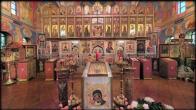ABOUT ORTHODOXY
You are here
The Parable of the Evil Husbandman
We find the parable of the evil husbandmen in the first three Evangelists (Matthew 21:33-41, Mark 12:1-9, Luke 20:9-16). Here is how the Evangelist Luke transmits this parable:
A certain man planted a vineyard, and let it forth to husbandmen, and went into a far country for a long time. And at the season he sent a servant to the husbandmen, that they should give him of the fruit of the vineyard: but the husbandmen beat him, and set him away empty. And again he sent another servant: and they beat him also, and entreated him shamefully, and sent him away empty. And again he sent a third: and they wounded him also, and cast him out. Then said the lord of the vineyard, What shall I do? I will send my beloved son: it may be they will reverence him when they see him. But when the husbandmen saw him, they reasoned among themselves, saying, This is the heir: come, let us kill him, that the inheritance may be our's. So they cast him out of the vineyard, and killed him. What therefore shall the lord of the vineyard do unto them? He shall come and destroy these husbandmen, and shall give the vineyard to others (Luke 20:9-16).
This parable was uttered in the Jerusalem temple itself not long before the Lord Jesus Christ's death on the Cross, and was addressed to the Sanhedrin (the highest court, which was located in Jerusalem and consisted of seventy-two members under the presidency of the high priest).
In the parable of the evil husbandmen, which was directed in denunciation of the leaders of the people who had rejected and killed the prophets and, most important of all, who also rejected and crucified Jesus Christ Himself - there is disclosed the history of God's forethought for the chosen people, God's long-suffering toward its leaders and the sad result of their bitterness against Christ and His teaching. Not suspecting at first that the parable was referring to them, the chief priests and the elders of the people, allured by its logic, themselves passed sentence on themselves: He will miserably destroy those wicked men, and will let out his vineyard unto other husbandmen, which shall render him the fruits in their seasons (Matthew 21:41), which is expressed in the Lord's words thus: The kingdom of God shall be taken from you, and given to a nation bringing forth the fruits thereof (Matthew 21:43).
For greater clarity of speech, Christ used, like a canvas, the Prophet Isaiah's "song of the vineyard" (Isaiah 5:1-7), which was well known to the Pharisees and lawyers, wherein it is said that to the "vineyard" - to the "house of Israel", that is, to the Hebrew people as a whole with its Old Testament Church, much labor and care were allotted by the Owner - God. Indeed, everything was given by God to the chosen people for its successful development. God Himself was the Leader of the people after its exodus from Egypt, manifesting a multitude of miracles and signs; afterwards, the supreme authority over the people was turned over to the spiritual leaders chosen by God.
The Evangelist Matthew adds to the parable certain important details which are absent from the Apostle Luke's account. The Apostle Matthew informs us that the vineyard's owner hedged the vineyard "round about, and digged a winepress in it, and built a tower…"
The "hedge" around the vineyard is the Law of Moses, which, like a "fiery wall", defended the Hebrews from the influence of the Gentiles and preserved them from deviations from the norm of life, by containing in itself in prefiguring the doctrine, religious ordinances and rites which were to have given the people the true content of life. God also continued to take thought for the Hebrews after their entry into the promised land. The "tower" in the vineyard served as an abode for the watchmen who guarded the vineyard. In the parable, the tower, according to the interpretation of the Holy Fathers, signified the temple in Jerusalem. The "winepress" served literally for pressing out the grape juice; in the parable it signified the altar whereon the blood of sacrificial animals was shed, prefiguring the redeeming blood of Jesus Christ.
Having arranged everything well, the owner of the vineyard went away, leaving husbandmen in it, who at a specified time were to have given to the owner the fruits obtained. So too, the Lord, having arranged everything well in the Old Testament Church, entrusted the direction of the people's religious and moral life to the spiritual leaders, in the first place to the chief priests and the priests, who were to have given to the people the content of life in the spirit of God's Law and to have brought forth in the people the fruits of a life according to God's commandments. The good estate of the "vineyard" depended on them, and they bore responsibility before God.
But, in governing the people, the spiritual leaders were not concerned about its spiritual perfection, pursuing instead personal, mercenary interests. With malice, they cruelly slew the servants of God, the Old Testament prophets, of whom, according to the word of the Apostle Paul, the world was not worthy (Hebrews 11:38), because the prophets reminded the preceptors of the people of their duty before God and required of them "fruits", that is, a life according to God's will. Thus, for example, the Prophet Isaiah was sawn in two with a wooden saw, Jeremiah and Zachariah were killed by stoning, many were tortured or, according to the word of the Apostle Paul, had trial of cruel mockings and scourgings, yea, moreover of bonds and imprisonment: they …were tempted, were slain with the sword: they wandered about in sheepskins and goatskins; being destitute, afflicted, tormented… (Hebrews 11:37-37; Nehemiah 9:26 and others). In exactly the same way, the leaders of the people also killed, persecuted and tortured the Apostles and many followers of Christ.
The owner in the parable sent his one son, his well-beloved…last unto them (Mark 12:6) - in reality, God sent His Only-begotten Son, Jesus Christ, the heir (Hebrews 1:2), unto Whom all things are delivered of His Father (Matthew 11:27); but, at the time when the Lord was uttering this parable, the spiritual leaders of the people had already decided to kill Him, fearing to be deprived of their domination over the Old Testament Church and their authority over the people. The crime of deicide, which was being prepared by the chief priests and the Sanhedrin, took place shortly thereafter, just as it is depicted in the parable: The Saviour was given over to execution outside the vineyard (Matthew 21:39), that is, outside the gates of Jerusalem (Hebrews 13:12), which was the center point of the Old Testament Church.
The Evangelist Matthew writes that the Lord, having finished the parable, asked this question of the chief priests and members of the Sanhedrin: When the lord therefore of the vineyard cometh, what will he do unto those husbandmen? To this he received the very logical answer: He will miserably destroy those wicked men, and will let out his vineyard unto other husbandmen, which shall render him their fruits in their seasons (Matthew 21:40-41).
Glancing at his collocutors, who were assured of the impossibility of being deprived of their inherent advantages, the Lord highlighted His thought that they were excluding themselves from the Kingdom of Christ that was being newly established, by reminding them of the prophecies which they themselves attri-buted to the Messiah: The stone which the builders rejected, the same is become the head of the corner: this is the Lord's doing, and it is marvellous in our eyes (Matthew 21:42; Luke 20:17; Psalm 117:22-23; Isaiah 28:16; I Corinthians 3:11; Romans 9:33 and others). The spiritual construction of God's Church was entrusted to the leaders; but they rejected Christ, the Cornerstone of this temple. Despite their rejection, the Stone lay all the same as the foundation of the corner, and united in the New Testament Church two "walls": believers from the Jews and the Gentiles. The fulfillment of the prophecy on Jesus Christ demonstrates that God the Father Himself sent Him into the world in order to found the Church and to serve as an object of amazement and reverence for all the faithful redeemed by Him (Matthew 12:42; Mark 12:10-11). From the leaders of the people, who rejected Christ the Messiah and did not desire to understand the essence of His Kingdom, it will be taken away and given to all the members of Christ's Church who bear the fruits of true faith and virtue.
The teachers of the people understood, finally, that the parable referred to them. Certain of them when they heard it, they said, God forbid. (Luke 20:16), that is, God forbid that the Church be taken away from them and given to others.
Saint John Chrysostom writes that the pronouncing of the sentence by Christ's enemies themselves against themselves "was a clear proof that it was not the Punisher, but the punished who were the cause of the punishment sent down upon them". This more than anything angered and embittered the chief priests and the Pharisees, and they tried at that time to lay hands on him (Luke 20:19; Matthew 21:46). Only fear before the people, who revered the Lord as a prophet, stopped them for a time from committing this evil deed.
Christ's prophecy concerning the punishment of the evil husbandmen and the transfer of the vineyard to others was fulfilled exactly thirty-five years after Jesus uttered this parable. The Roman commander, Titus, destroyed Jerusalem and all of Palestine, and the Jews where dispersed throughout the whole world.
It was good for the workers of the vineyard to remain and labor in the vineyard - it was so good, that they began to consider this place to be their own. All that they had, all that the Owner had given to them for their maintenance, they began to take as their due. All of this so gripped them, that they completely forgot that all of this was temporary, and that the years will pass and the hour will come when they will have to leave the vineyard and hand it over to others. They distorted their spiritual life and lived only according to the flesh. They stifled their conscience. The matter reached the point where the workers of the vineyard even killed the Owner's heir, only in order not to give up the enjoyment of the vineyard.
Christ's word is eternal. The parable of the evil workers of the vineyard bears a relation not only to the leaders of the people of Christ's time, but also to us, people working in the new vineyard of Christ - in the Church. If the new leaders of the faithful people, the princes of the Church - the patriarchs, metropolitans, bishops and priests - will behave as did the workers of the vineyard in the parable, the same lot awaits them: they will be rejected by the Owner - God, and the vineyard will be transferred to other, worthy workers.
This parable in equal measure relates also to each faithful Christian. In the parable of the evil workers of the vineyard, Christ forewarns us lest it happen thus to us also, lest the earthly beauty in which we live be turned into the vineyard of the parable and allow us to forget that the Lord of the vineyard shall come and require an account of our work.
Let us then labor in the vineyard and bear its fruits unto its lawful Owner - God.
©V. Potapov
PARISH LIFE
RECENT VIDEOS
Address of our Cathedral
Subscribe to our mailing list
While all the materials on this site are copyrighted, you may use them freely as long as you treat them
with respect and provide attribution on the Russian Orthodox Cathedral of St.John the Baptist of Washington DC.









